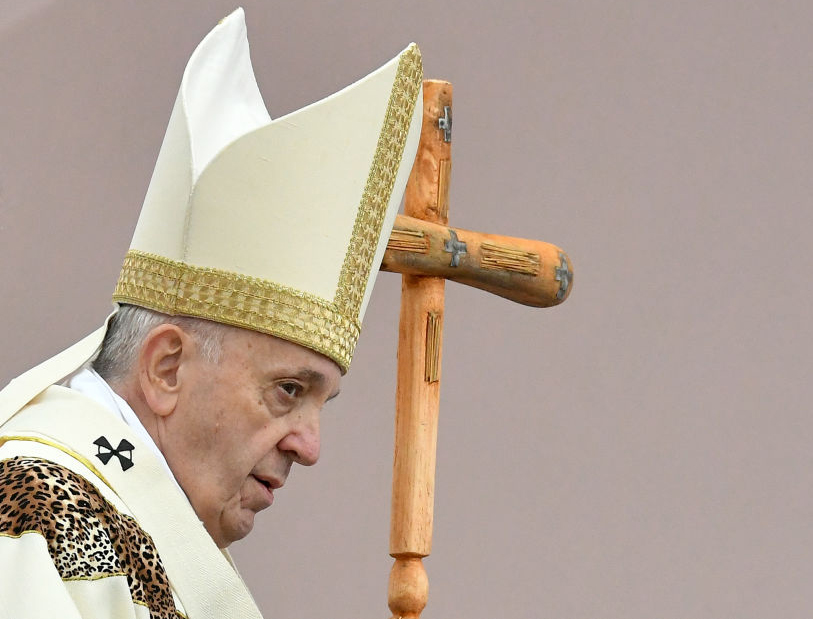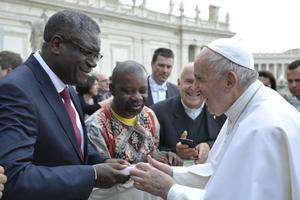Pope Francis Explains What He Means by ‘Proselytism’ and ‘Evangelization’
Speaking earlier this month to Jesuits in Mozambique, the Holy Father linked proselytism to the ‘prosperity gospel,’ and endorsed the controversial 2017 essay co-authored by Father Antonio Spadaro.

In comments to a group of Jesuits in Mozambique published Thursday, Pope Francis gave arguably his clearest explanation to date of what he means by proselytism and evangelization, but did so by indirectly endorsing a controversial “ecumenism of hate” essay that appeared in the Jesuit periodical La Civiltà Cattolica.
In his Sept. 5 comments published Sept. 26 in La Civiltà Cattolica, the Pope made it clear that he sees proselytism as tied with the “prosperity gospel” popularly promoted by certain Protestant groups, although he also appears to see “Catholic fundamentalist” groups as promoting the same ideology, one which Holy Father said emphasizes “proselytism more than evangelization.”
In particular, he makes a point of endorsing a controversial 2017 essay in which Jesuit Father Antonio Spadaro, editor of La Civiltà Cattolica, Marcelo Figueroa, editor of L’Osservatore Romano’s Argentine edition and a Presbyterian pastor, criticized Evangelical and Catholic “fundamentalist” groups for creating an “ecumenism of hate.”
The two editors saw them as promoting a “theology of prosperity,” fostering a “political Manichaeism,” a “cult of the apocalypse,” and driving towards an “ecumenism of conflict” with the goal of “nostalgic dream of a theocratic type of state.”
The essay was criticized in the U.S. as showing an ignorance of U.S. politics and religion.
From his comments, the Pope clearly sees proselytism as linked to a prosperity gospel, an attempt to “make proselytes” which, he said, Jesus condemned in the Pharisees.
For the Pope, evangelization is and must be free.
“Evangelization is essentially witness,” he told the Jesuits in Mozambique. “Proselytizing is convincing, but it is all about membership and takes your freedom away.”
Below is the complete exchange, given to a group of 24 Jesuits on Sept. 5 in Maputo, Mozambique:
Next came a question from Bendito Ngozzo, chaplain of the Santo Inácio Loyola High School: “Some Protestant sects use the promise of wealth and prosperity to make proselytes. The poor become fascinated and hope to become rich by adhering to these sects that use the name of the Gospel. That’s how they leave the Church. What recommendation can you give us so that our evangelization is not proselytism?”
POPE FRANCIS: What you say is very important. To start with, we must distinguish carefully between the different groups who are identified as “Protestants.” There are many with whom we can work very well, and who care about serious, open and positive ecumenism. But there are others who only try to proselytize and use a theological vision of prosperity. You were very specific in your question.
Two important articles in Civiltà Cattolica have been published in this regard. I recommend them to you. They were written by Father Spadaro and the Argentinean Presbyterian pastor, Marcelo Figueroa. The first article spoke of the “ecumenism of hatred.” The second was on the “theology of prosperity.” Reading them you will see that there are sects that cannot really be defined as Christian. They preach Christ, yes, but their message is not Christian. It has nothing to do with the preaching of a Lutheran or any other serious evangelical Christianity. These so-called “evangelicals” preach prosperity. They promise a Gospel that does not know poverty, but simply seeks to make proselytes. This is exactly what Jesus condemns in the Pharisees of his time. I’ve said it many times: proselytism is not Christian.
Today I felt a certain bitterness after a meeting with young people. A woman approached me with a young man and a young woman. I was told they were part of a slightly fundamentalist movement. She said to me in perfect Spanish: “Your Holiness, I am from South Africa. This boy was a Hindu and converted to Catholicism. This girl was Anglican and converted to Catholicism.” But she told me in a triumphant way, as though she was showing off a hunting trophy. I felt uncomfortable and said to her, “Madam, evangelization yes, proselytism no.”
What I mean is that evangelization is free! Proselytism, on the other hand, makes you lose your freedom. Proselytism is incapable of creating a religious path in freedom. It always sees people being subjugated in one way or another. In evangelization the protagonist is God, in proselytism it is the I.
Of course, there are many forms of proselytism. The one practiced by soccer teams, acquiring fans, is all right, obviously! And then it is clear that there are those forms of proselytism for commerce and business, for political parties. Proselytism is widespread, we know that. But it doesn’t have to be the case with us. We must evangelize, which is very different from proselytizing.
St. Francis of Assisi told his friars: “Go out to the world, evangelize. And, if necessary, use words, too.” Evangelization is essentially witness. Proselytizing is convincing, but it is all about membership and takes your freedom away. I believe that this distinction can be of great help. Benedict XVI in Aparecida said something wonderful, that the Church does not grow by proselytism, it grows by attraction, the attraction of witness. The sects, on the other hand, making proselytes, separate people, promising them many advantages and then leaving them to themselves.
Among you there are certainly theologians, sociologists and philosophers: I ask you to study and deepen the difference between proselytism and evangelization. Read well Evangelii Nuntiandi of Paul VI. There it is clear that the vocation of the Church is to evangelize. Indeed, the very identity of the Church involves evangelizing. Unfortunately, however, not only in the sects, but also within the Catholic Church there are fundamentalist groups. They emphasize proselytism more than evangelization.
Another typical thing about proselytizing is that it does not distinguish between the internal and external forums. And this is the sin into which many religious groups fall today. That is why I asked the Apostolic Penitentiary to make a statement on the internal forum, and that statement is really very good.
Evangelizers never violate the conscience: They announce, sow and help to grow. They help. Whoever proselytizes, on the other hand, violates people’s conscience: This does not make them free, it makes them dependent. Evangelization gives you a dependence, that is, it makes you free and able to grow. Proselytizing gives you a servile dependence at the level of the conscience and the society. The dependence of the evangelized person, the “paternal” dependence, is the memory of the grace that God has given you. The proselyte instead depends not as a child, but as a slave, who in the end does not know what to do unless he or she is told.
Once again I recommend these two articles in Civiltà Cattolica: read them and study them because they address much of what I am telling you. Here I tried to communicate to you the main message.
- Keywords:
- africa trip
- evangelization
- pope francis
- proselytism















